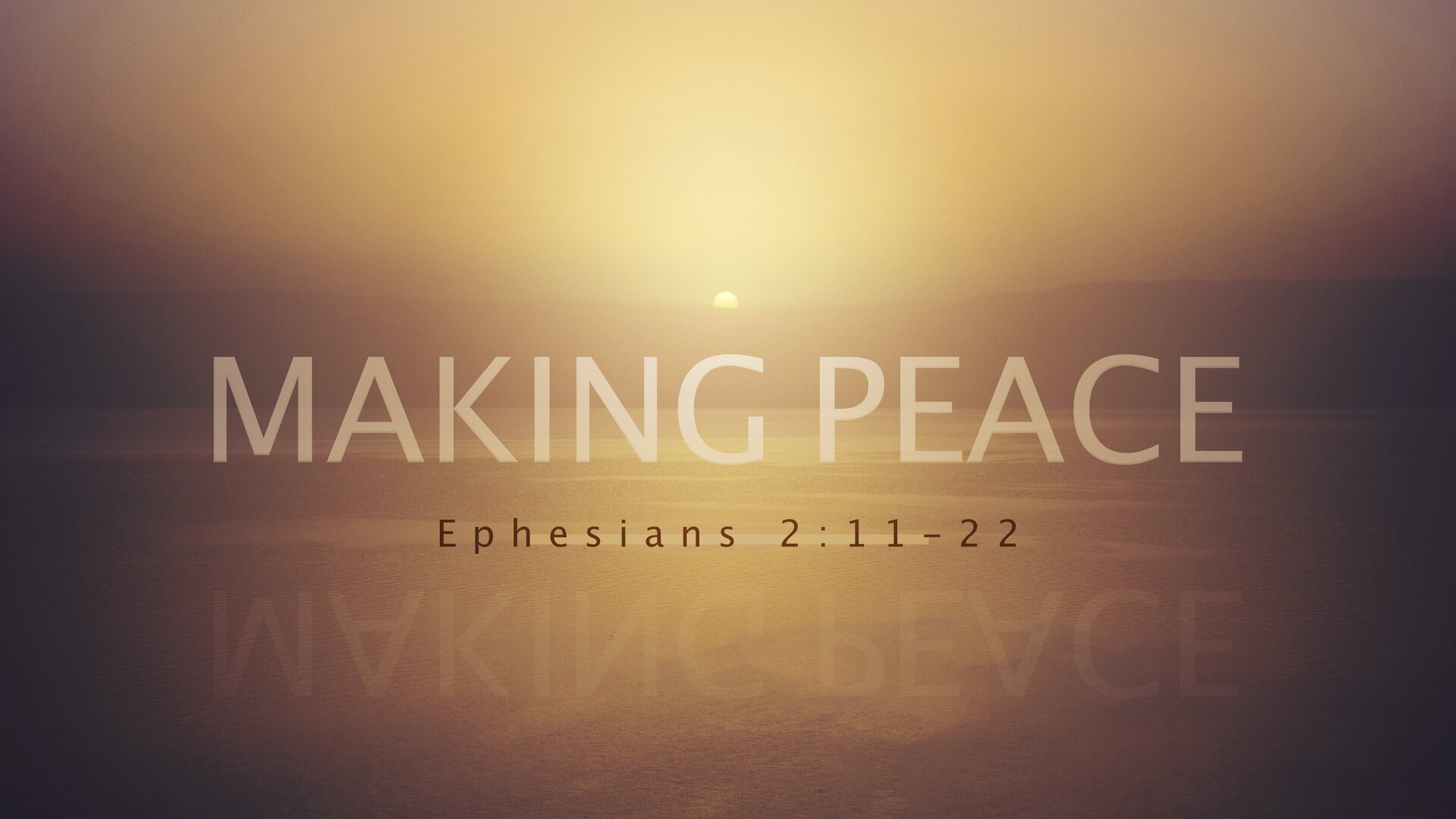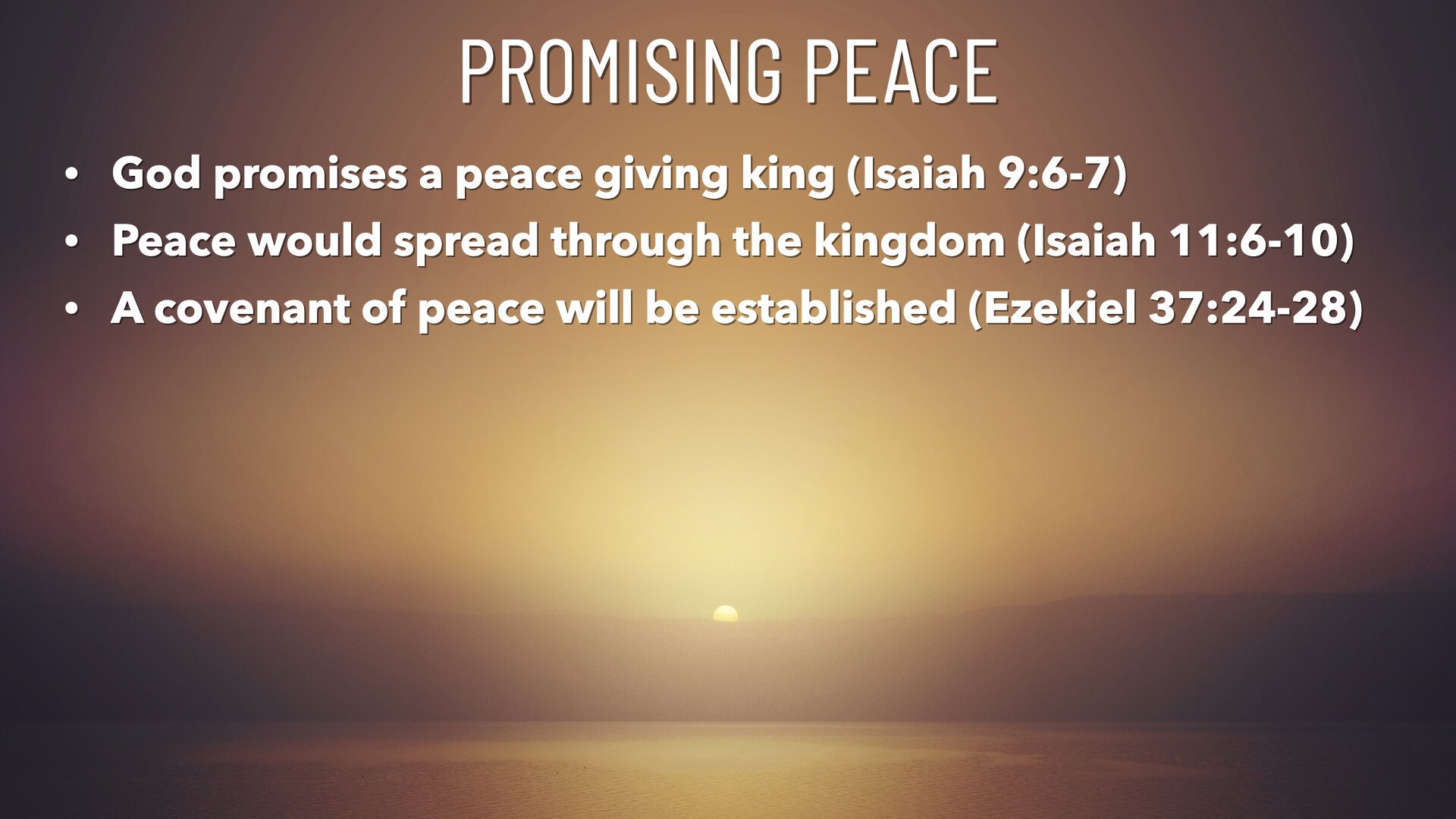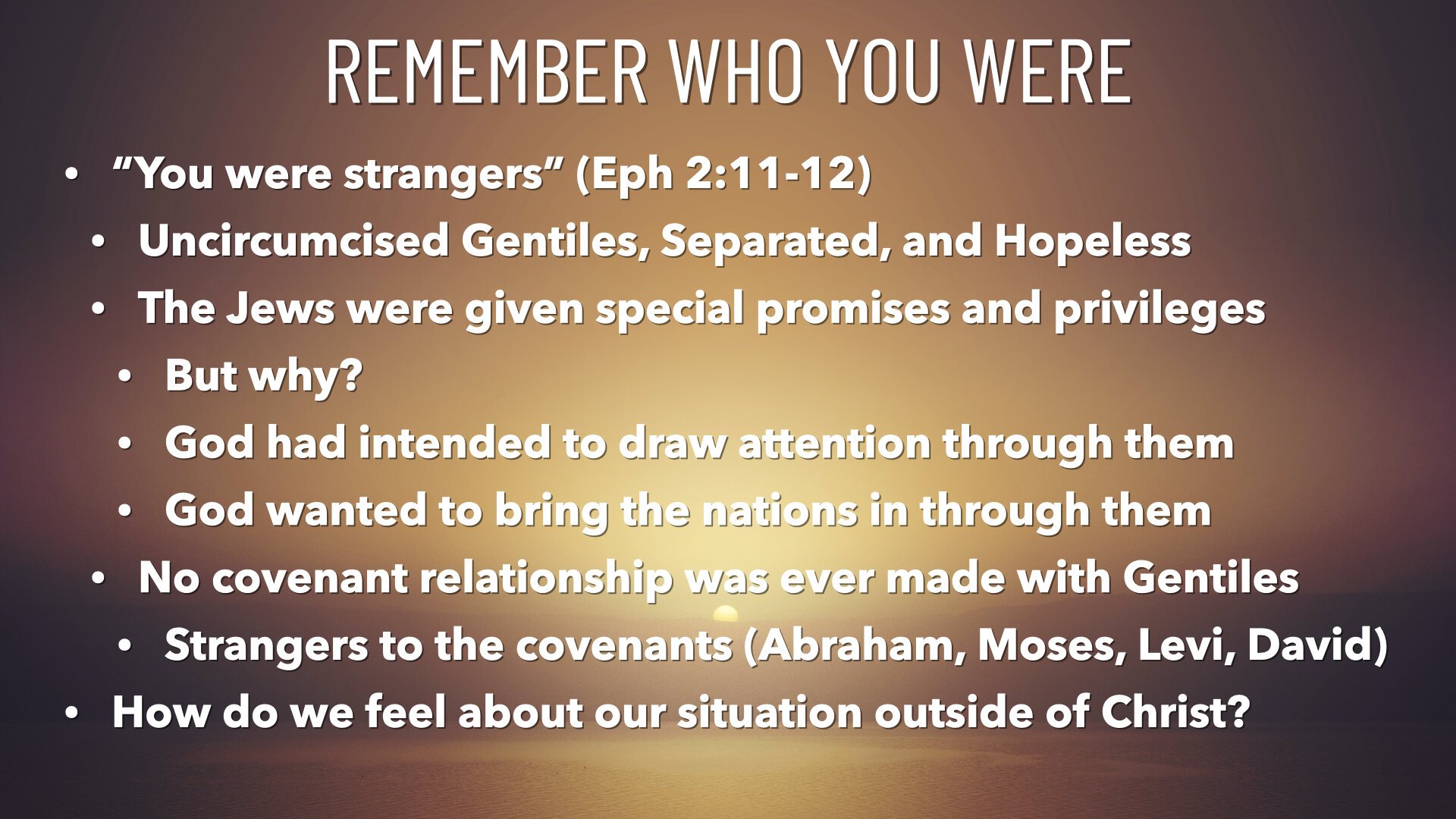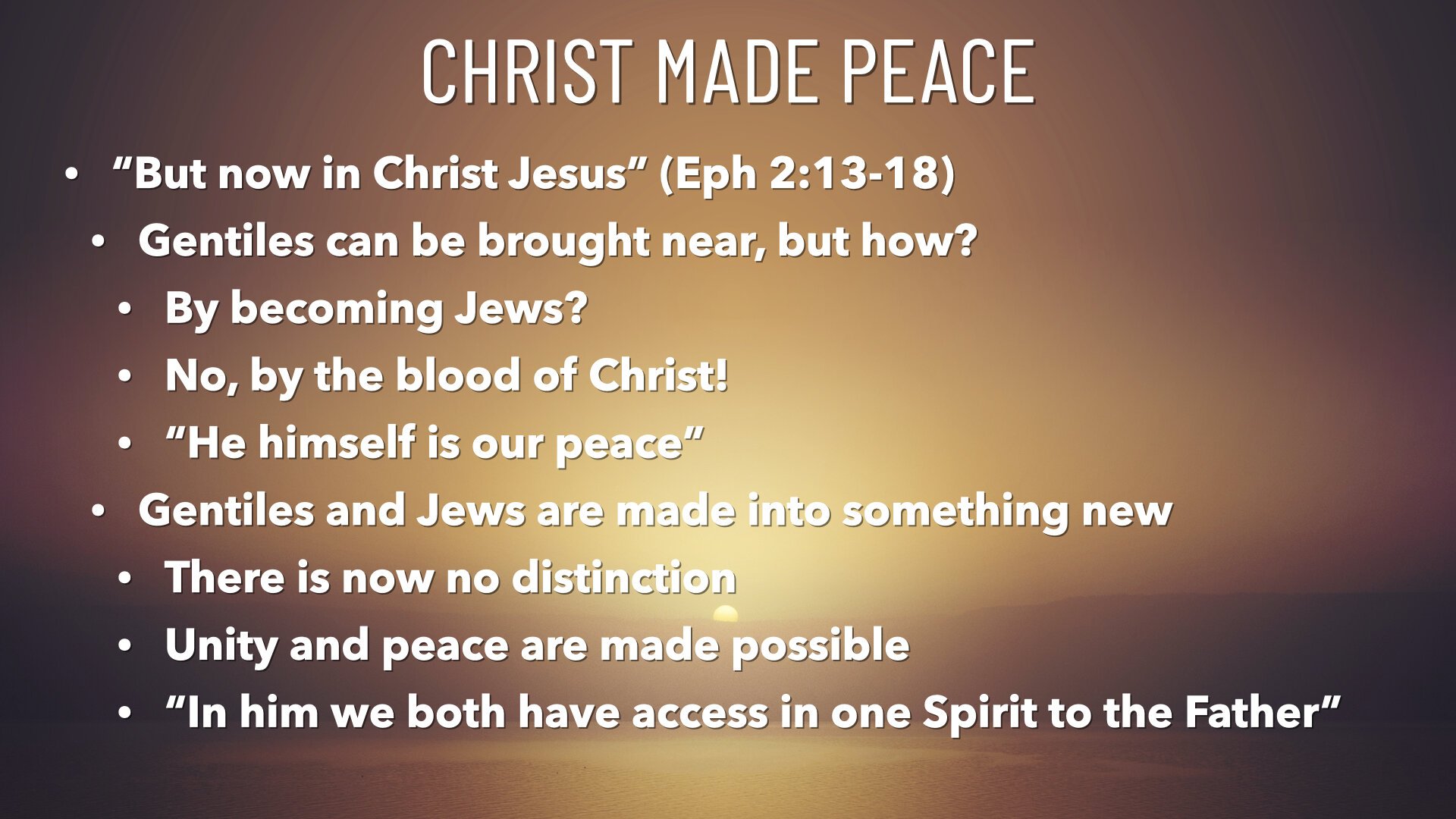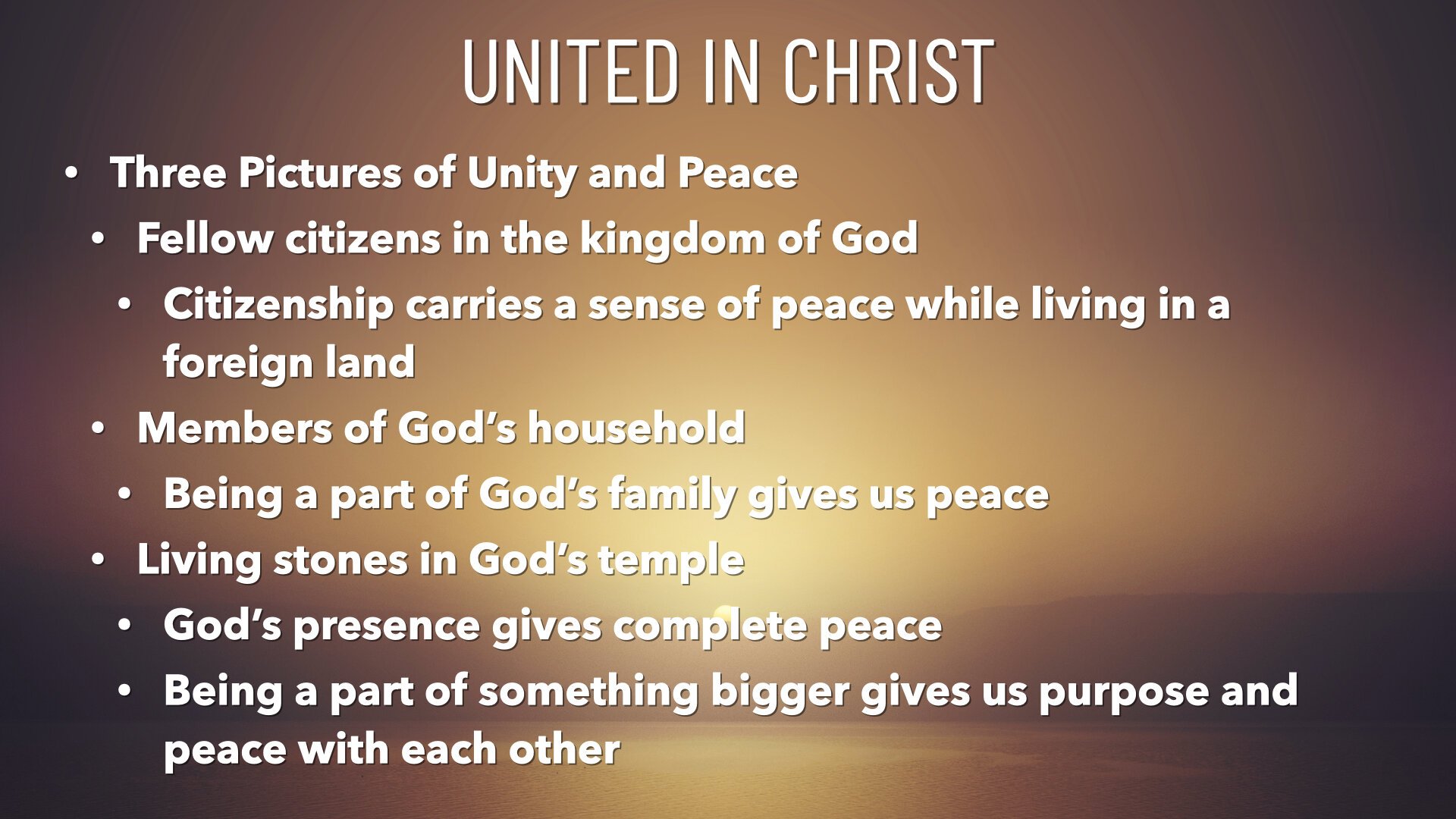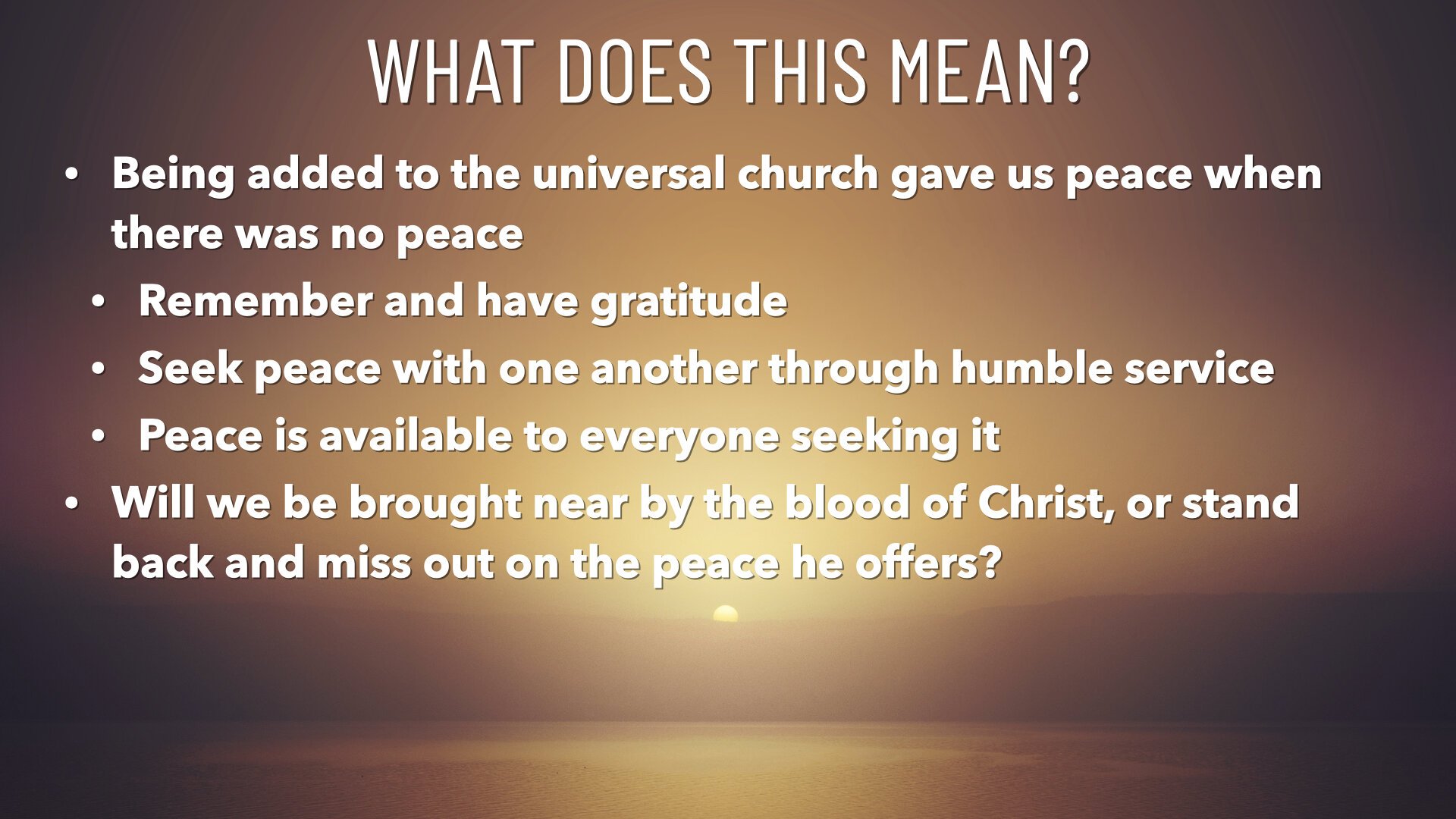Making Peace (Ephesians 2:11-22)
Our world is full of conflict, and the news seems to feed off of it. When mistreated by someone else, we think it is time to pounce on them and rip them to shreds. But all that does is create more unrest. The more we hate each other, the more we hate each other. It's a vicious cycle with no end in sight. Can God do anything to create peace?
In the Old Testament, God promised to bring peace. This morning, we are going to look at God's promise of peace. As we look at the Bible, we see that there are at least two different types of peace. In Christ, there is peace with God/each other. Then there is the peace of God which is like peace of mind. One is connected to the others, but they seem different. The peace of God is an inner peace that God provides his people. We will look at that more in-depth tonight.
Promises of Peace
Isaiah 9:6--7 (ESV) --- 6 For to us a child is born, to us a son is given; and the government shall be upon his shoulder, and his name shall be called Wonderful Counselor, Mighty God, Everlasting Father, Prince of Peace. 7 Of the increase of his government and of peace there will be no end, on the throne of David and over his kingdom, to establish it and to uphold it with justice and with righteousness from this time forth and forevermore. The zeal of the Lord of hosts will do this.
Peace is connected to a man who is God. Notice that his name is "Wonderful Counselor." Do we see how that name is intended to help us? A counselor guides us with life so that we can make wise decisions. Then, notice that he is called the prince of peace who brings endless peace as he rules on David's throne. God promises to give us a man as the king who will bring us the peace we desire in his reign. This sounds amazing. We feel all kinds of unrest and anxiety over the government, but this king will bring peace as he rules with justice and righteousness.
Isaiah 11:6--10 (ESV) --- 6 The wolf shall dwell with the lamb, and the leopard shall lie down with the young goat, and the calf and the lion and the fattened calf together; and a little child shall lead them. 7 The cow and the bear shall graze; their young shall lie down together; and the lion shall eat straw like the ox. 8 The nursing child shall play over the hole of the cobra, and the weaned child shall put his hand on the adder’s den. 9 They shall not hurt or destroy in all my holy mountain; for the earth shall be full of the knowledge of the Lord as the waters cover the sea. 10 In that day the root of Jesse, who shall stand as a signal for the peoples---of him shall the nations inquire, and his resting place shall be glorious.
This Chapter starts with another description of a ruler who does what is right, but this section tells us that there will be peace between the different people in the land. Imagine a wolf and lamb living together in harmony. The wolf doesn't devour the lamb. The lamb doesn't fear the wolf. There is peace. He adds all kinds of animals to this imagery before explaining what he means. In verse 9, he says, "They shall not hurt or destroy in all my holy mountain." "My holy mountain" is a reference to Jerusalem. So God is saying that his people will love each other. They will do what is good for one another. Why? They will be full of the knowledge of the Lord. God is going to spread the understanding of him, and that will lead to unity and love.
The last section in the Old Testament we are going to look at is from Ezekiel.
Ezekiel 37:24--28 (ESV) --- 24 “My servant David shall be king over them, and they shall all have one shepherd. They shall walk in my rules and be careful to obey my statutes. 25 They shall dwell in the land that I gave to my servant Jacob, where your fathers lived. They and their children and their children’s children shall dwell there forever, and David my servant shall be their prince forever. 26 I will make a covenant of peace with them. It shall be an everlasting covenant with them. And I will set them in their land and multiply them, and will set my sanctuary in their midst forevermore. 27 My dwelling place shall be with them, and I will be their God, and they shall be my people. 28 Then the nations will know that I am the Lord who sanctifies Israel, when my sanctuary is in their midst forevermore.”
On multiple occasions, God promises to make an everlasting covenant of peace with his people. This covenant is foretold in Jeremiah as God will forgive everyone, and they will know the Lord. Here we see that God promises to give them a king to lead them. They will be careful to do God's commands, and God will have a covenant with them. This covenant relationship shows that there will no longer be a hostile relationship with God. This new covenant will not be like the Old Covenant. It will be a covenant of peace.
Peace Delivered
Where in the New Testament do we read about God fulfilling his promise of peace? Last week, we studied in Ephesians 2 about God demonstrating his power by raising us from spiritual death. He provided the grace we needed to go from being dead in our sins to being alive in Christ. This week, I want to pick up where we left off and notice how he continues to talk about God's power to save us.
Strangers
Ephesians 2:11--12 (ESV) --- 11 Therefore remember that at one time you Gentiles in the flesh, called “the uncircumcision” by what is called the circumcision, which is made in the flesh by hands--- 12 remember that you were at that time separated from Christ, alienated from the commonwealth of Israel and strangers to the covenants of promise, having no hope and without God in the world.
To begin with, he says that the Ephesians were "Gentiles in the flesh." Perhaps there were some Jewish Christians in Ephesus, but these Christians have been labeled "Uncircumcised." To be "uncircumcised" is commonly a derogatory idea. Remember how David mocked Goliath in 1 Samuel 17 by calling him an "uncircumcised" Philistine. That was a way of trashing everyone who was not an Israelite. That labeled them as unclean and unholy. Paul says, "Remember that you were at that time separated from the Messiah." They were not a part of the chosen people of God. They were not enjoying the same blessings as Israel of a relationship with God.
The truth is that God treated the Jews in a particular way throughout the Old Testament. He made exceptional promises to the Jews that the Gentiles had no part in. God did that for two reasons. First, he did that so that his people would be separate from everyone else. He didn't want their ways to be corrupted by the ways of the idolatrous nations. Second, he did that so that the surrounding nations would see and pay close attention to what God was doing. There wasn't a nation that had a god-like Israel. God's intention was always to use Israel as a channel to bring the nations to him. He wanted them to be a kingdom of priests for his glory.
The Jews took this special privilege and became proud. They thought they were elite because of their heritage. They completely missed God's desire to bring the Gentiles into the family and share the blessings with them. Even in the first century, the Jews still believed they were elite as they distinguished themselves from the uncircumcised.
Paul doesn't want the Ephesians to ignore the past or become bitter about it. He wants them to remember it. Remember that they were utterly hopeless in the world. They had no idea what was waiting for them on the other side of death. Gentiles spent their lives chasing vain passions and pleasures instead of having hope and meaning. We also must remember our past situation. We were without hope. We had no idea what was waiting on the other side of death because sin separated us from Christ.
Also, notice that Paul brings up the covenants of promise. He doesn't just bring up one covenant. He brings up multiple covenants. These would have been the Abrahamic, Mosaic, Davidic, Levitical, and the Prophetic Covenant of peace we just read about. All of the covenants God made in the Old Testament were for his people to have a relationship with him. But the Gentiles were strangers to the covenant relationship. God made none of those promises to the Gentiles. That means God made none of them to us. We were left out of the promises God wanted to give his people before we gained Christ.
Brought Near
Verse 13 should stand out to us.
Ephesians 2:13--18 (ESV) --- 13 But now in Christ Jesus you who once were far off have been brought near by the blood of Christ. 14 For he himself is our peace, who has made us both one and has broken down in his flesh the dividing wall of hostility 15 by abolishing the law of commandments expressed in ordinances, that he might create in himself one new man in place of the two, so making peace, 16 and might reconcile us both to God in one body through the cross, thereby killing the hostility. 17 And he came and preached peace to you who were far off and peace to those who were near. 18 For through him we both have access in one Spirit to the Father.
Do you see that, in the first part of this section, Paul makes it clear that the Gentiles were without hope? But now, in Christ, all the glorious promises God made to Israel have come true to the Gentiles. We are no longer separated from promises and blessings. The most amazing part is that the Gentiles don't have to become Jews to receive it. Paul says that Moses' Law became a dividing wall between Jew and Gentile until Christ made it obsolete. He replaced that law with his law, where God can forgive people of sins based on his blood and righteousness. They can be made a part of the covenant community through the blood of Christ. God has paid the high price to give all mankind access to God. Now we can draw near to him even though we were the farthest from him.
Jesus has made peace where there was hostility. Notice the words, "he himself." Those words are trying to make it very clear that Jesus became the peacemaker. He became what the Gentiles needed to be restored to God. He became peace for us.
One Group
Also, notice that he made us all one in him. Before, there were two groups in mankind. There were the Jews who had the law and a history of relationship with God. Then, there were the Gentiles who were excluded from the covenant relationship God had with the Israelites. A new race has been formed in Christ. The body of Christ or the church is composed of men and women from all different backgrounds with different levels of obedience to Moses's Law. But there can be peace with God and union with everyone else in Christ. All who put their hope in Christ and believe in him are a part of the saved people, the church. It doesn't matter what you look like, where you came from, what language you speak, or what people think of you. God's call is for everybody, and there is no distinction between peoples. All are allowed to draw near to God through the blood of Jesus.
If someone says that they are superior to someone else in Christ, they are completely wrong. All were dead in their sins, and all were made alive by God's grace. None are superior. We have to let ourselves die and let selfishness die to have peace and unity with Christ and one another. This is not a group of boasters. This is a group of humble servants.
The cross of Christ has accomplished the ultimate goal of God to bring peace to all mankind. We have peace with each other and peace with him as we enter into the body of Christ. There is no special privileged group of people inside the body of Christ. Every Christian all over the world is on the same playing field. But this means that we have what Abraham, Isaac, Jacob, Moses, and David have because we all have access to God like they do. We have something we've never had before. Verse 18 says we have access in one Spirit to the Father. Look at the next section!
God's Temple
Ephesians 2:19--22 (ESV) --- 19 So then you are no longer strangers and aliens, but you are fellow citizens with the saints and members of the household of God, 20 built on the foundation of the apostles and prophets, Christ Jesus himself being the cornerstone, 21 in whom the whole structure, being joined together, grows into a holy temple in the Lord. 22 In him you also are being built together into a dwelling place for God by the Spirit.
Now Paul describes what this means for the Ephesian Christians using three images.
First, he says they have gone from strangers to fellow citizens. In our world, we know the benefits of citizenship. Traveling to other countries teaches us that citizenship is essential. There are privileges that we enjoy as American citizens. Everyone doesn't enjoy those same privileges. But Paul reveals that we are citizens in the kingdom of God. We have all rights and privileges as a citizen. We belong here. Peace is not found by staying a stranger and foreigner. Peace is found by becoming a citizen of the heavenly kingdom.
Then, he repeated the image he used back in Chapter 1, saying that they are members of God's household. The Ephesian Christians are God's children alongside all Jewish believers, and God doesn't pick favorites. All are family members, enjoying all rights and privileges a family member would enjoy. That means that everyone else is a part of my family as well. We have peace with one another because our Father trains us to walk in his ways, and he is the ultimate peacemaker. We act like God's children when we seek to love each other as he has loved us.
The third image is about us belonging to the holy temple of God. He transitions from talking about us as God's household to talking about us as God's house. We are a part of God's temple. The temple throughout the Old Testament was the place where God's name would dwell on the earth. It was the place where the nations could go to understand the God of Israel. It's interesting to see the many ways that this image is used throughout the New Testament. Jesus was the literal temple of God. But, Paul also says that the local congregation and we each individually are the temple of God. This text portrays the universal church as God's temple. Overall, the image is quite clear that God dwells with his people. Also, it makes it clear that we are interdependent on one another. We aren't independent. We must shun the idea that we can live as individual Christians out on an island. We are here to build one another up and lift others higher so that the temple becomes what brings God praise and glory.
In this text, we learn that we are a temple built on the foundation of the apostles and prophets, with Jesus being the most significant cornerstone. This shows us that we are all working together to become what God has called us to be. We are the place where God's name dwells. This joined purpose gives us peace with one another.
What Does This Mean?
When God added us to the church, he gave us the same blessings as everyone else. The number of sins in our past and the struggles we face daily do not make us any less a member of Christ's body. We are all joined together as one cohesive unit.
We must look at this and recognize that God has joined us to murderers and prostitutes, but he has also joined us to Peter and Paul. We are all joined together in Christ, and that union has given us peace with each other and peace with God.
Application
So, how does the fulfillment of this promise affect us? First, we are called to remember where we came from so that we can maintain humility. As we speak about the promises of God, how many were made directly to us? None! We were strangers and foreigners to the promise. How many of us have, at some point, completely lost sight of how lost we once were? When we were dead in our sins, we, too, were strangers to the covenants of promise. We had no hope for peace because we had made ourselves God's enemies. But God sent Jesus to be the Prince of Peace, and he delivered. His blood has paid the price for our sins and created peace with God. We must never forget this and never lose the gratitude we ought to have for that privilege.
Second, we see that we are called to deeper relationships with one another. We are family, and we are called to have peace with one another. Jesus can join the wolf and the lamb together for God's glory. We must not see our relationships as a duty or responsibility. It is not our duty to come together a couple of times a week. The family we have in Christ is the most important family we have.
Finally, notice that peace is available to everyone. Everyone who is far from God should come to the church (not the building) and find a better understanding of who God is and what God has done for them. We have to remember that we were enemies of God just like them. So many times, people in the world think that they have peace with God by being a good person. They don't see that God is way too holy and righteous to let a guilty sinner into his presence without the blood of Christ. They may be closer than others, but they can still claim peace based on their righteousness. Not one of us has loved God with all our heart, soul, mind, and strength. Not one of us has truly loved our neighbor as ourselves. We must all submit and enter into God's family through Jesus to have peace with God.
This means that instead of peace, they have judgment waiting for them. So long as someone refuses to accept Christ's sacrifice, they are worthy of judgment. Peace is available, and God holds out his hand, seeking to draw everyone in. But we must accept peace on his terms, not our own.
Conclusion
In a world full of in-fighting and conflict, God is working to make peace. He is fighting against the grain to create a people who are peace-makers. So what are we going to do with this Jesus? If you haven't submitted your life to Christ, you are still an outsider. But like me and everyone else here who has submitted their life to Christ, you can be brought near by the blood of Jesus. The only thing stopping you from enjoying the blessings is you. God's arms are open wide, and so are ours. We all must see the blessing Jesus offers and become a part of Christ's body. We have to submit to God and let him wash away every sin. Then, we must have a transformed heart that seeks God's praise through careful obedience.

